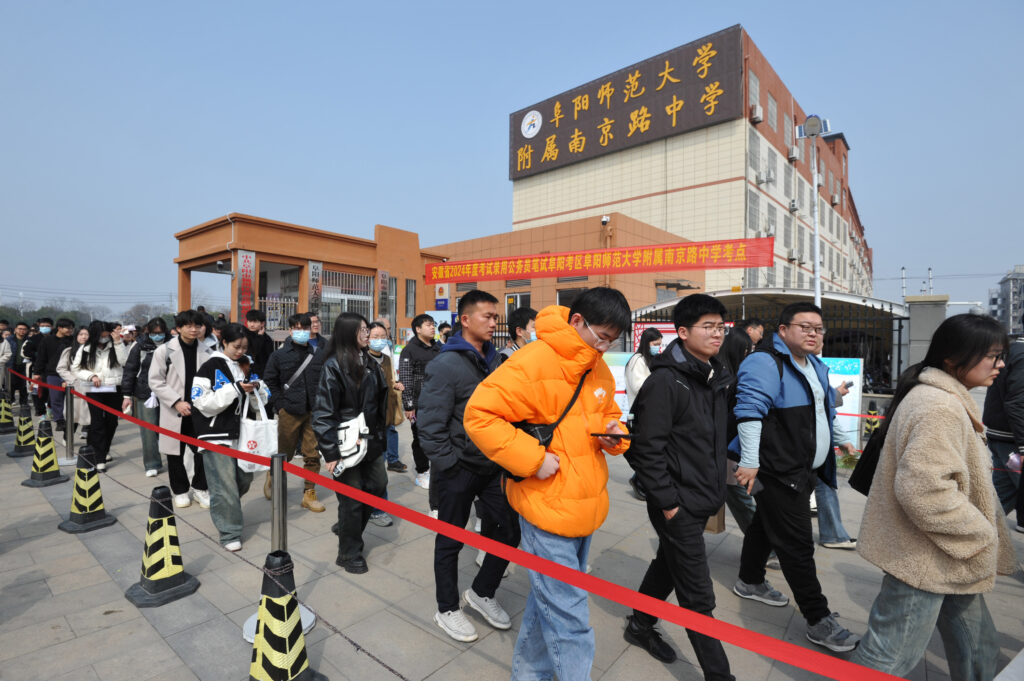Historically, working as a bureaucrat or government official was considered the most prestigious career in China. The Chinese Communist Party still enjoys recruiting young talent into the ranks of officialdom, but this is eventually going to harm economic prospects in the long run, as more youths decide not to dedicate their talents to innovation in the private sector.
The allure of public service dates back to the Song Dynasty (960–1279) when Confucianism became China’s dominant cultural and ethical paradigm. Confucianism emphasises the social order of occupations, ranking from gentry scholars, peasant farmers, artisans and craftsmen, and then merchants and traders. Working for the government is considered as being in the same rank as gentry scholars and was a popular career option for those with high social status.
The Party largely upended this social ranking when it founded the People’s Republic of China and instead prioritised peasant farmers under former chairman Mao Zedong. When China began experimenting with economic reforms in 1978, artisans, craftsmen, merchants and traders were considered more critical than bureaucrats for boosting rapid economic development.
But due to the nature of the communist regime, where privatisation was largely prohibited, the government owned and operated large sectors of the economy under far-reaching state-owned enterprises buoyed by a high volume of inflow of foreign direct investment. Pursuing a career in the government or a state-own enterprise seemed to be less profitable and had limited promotion opportunities, at least until Xi Jinping came to power in 2012.
Working in government or state-owned enterprises was considered a stable and prestigious career since employment is reliant on government funds instead of private industrial competition, where the latter could imply the potential danger of losing jobs.
This higher-floor, lower-ceiling career path has been referred to as the ‘golden bowl’ in China. The golden bowl was not as attractive as it was during the periods of higher economic growth and reform in China, but has gained traction in recent years. In 2023, there were an average of 77 candidates for every single vacancy in the Chinese civil service. That is, there was merely a 1.2 per cent chance to be selected through examinations into the civil service. This not a revitalisation of Confucianism, but evidence of Chinese economic failure under Xi’s rule.
Since Xi came to power in 2012, he has dedicated more resources to the public sector and state-owned enterprises, causing the retraction of the private industry in China. He also directed a number of mergers between the public and private sections, enhancing the number of employees and the influence of the public sector within the Chinese market. This has led to a higher potential for graduates pursuing a civil service career.
Due to the increasing tensions between the United States and China and related reshuffling of the global supply chain directed by the United States, China has experienced a significant retraction of foreign direct investment, and a problem of overcapacity in a context where external markets can’t readily absorb its output. Beijing’s Belt and Road Initiative has not helped create the necessary market forces that would allow developing states — the primary partners in the BRI — to sufficiently absorb Chinese production.
As a result, economic development in China has slowed. Chinese youths may want to apply their talents in places with higher stability. Unsurprisingly, many graduates have started pursuing careers in the public sector.
The COVID-19 pandemic also created another layer of hindrance to the revitalisation of private industrial forces in China. The unemployment rate among the younger labour force aged 19–29 was reported to be over 40 per cent as recently as February 2024, the highest mark since the beginning of economic reforms in 1978. The country has also seen a retraction of domestic consumption and industrial development during and since the COVID-19 pandemic. With such a high level of uncertainty in the Chinese market, working in the government is a much preferable career choice among Chinese youths.
These factors together help explain why young Chinese people are clamouring to secure government jobs. But this is dangerous for Chinese economic development. When more and more young and talented people decide to pursue employment through the ’golden bowl’ instead of competing in the private market, the level of productivity and innovation will undoubtedly decline.
The Chinese government must first remedy its economic downturn and help young people stay competitive in the private market for the sake of the national economy.
Yao-Yuan Yeh is Fayez Sarofim – Cullen Trust for Higher Education Endowed Chair in International Studies, Department Chair of International Studies & Modern Languages, and Department Chair of Political Science at the University of St. Thomas, Houston.


In France too, and several other European countries, working for the government have been, still is, and probably will continue to be a rather prestigious professional resort in time of recession or planned “degrowth”. Perhaps Europeans have also a Mandarin ethics streak….